| Srl | Item |
| 1 |
ID:
149282
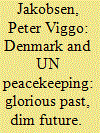

|
|
|
|
|
| Summary/Abstract |
Denmark became a staunch supporter of UN peacekeeping during the cold war because it simultaneously served its interests and values and this winning combination meant that it relatively quickly became internalized as part of Denmark’s foreign policy identity. Denmark turned its back on UN peacekeeping when NATO took over from the UN in Bosnia in 1995. Since then Denmark has prioritized NATO- and US-led operations. The Danish shift was driven by the interest in supporting the Western great powers as well as an altruistic desire to improve United Nations Protection Force’s (UNPROFOR) dismal humanitarian record in Bosnia. This belief was also generated by the positive lessons learned from Denmark’s pioneering use of tanks in UNPROFOR. This tank deployment and subsequent participation in NATO and US-led missions created a new warrior identity. This identity and the Danish interest in maintaining a close relationship to NATO’s great powers make a major Danish return to UN peacekeeping unlikely.
|
|
|
|
|
|
|
|
|
|
|
|
|
|
|
|
| 2 |
ID:
167131


|
|
|
|
|
| Summary/Abstract |
Over the past thirty years Denmark has become a capable and willing expeditionary ally, not least on account of an accelerated investment in new forces in the early to mid-2000s. With the 2005–2009 defence agreement the Danish Army scrapped its concept of conscripted mobilization and fully committed to deployable capacities; the navy became a ‘blue water’ navy given the commitment to build two combat support ships and three frigates and to scrap the submarine force; and the air force fully focused its organization on specialized and deployable ‘wings’. The literature suggests that external threats and technological innovation are key drivers of military change, which in broad strokes helps us understand Danish change—but not in full. As a small state, Denmark has been particularly attuned to the threat of abandonment by its NATO allies and the concomitant but rival desire to pay as little for defence as possible. NATO standing and money are thus the critical drivers of Danish military change and we are able to show how they have shaped three successive waves of military reform, beginning piecemeal in the 1990s and then continuing with deeper waves of reform in 2001 and 2014. Civil–military relations have throughout been quite solid and enabled change, which has to do with the political priority of securing Denmark's standing in NATO with as little money as possible, leaving it to the military services to figure out how to shape the toolkit.
|
|
|
|
|
|
|
|
|
|
|
|
|
|
|
|
| 3 |
ID:
075729


|
|
|
|
|
| Publication |
2006.
|
| Summary/Abstract |
This article takes issue with the prevailing view that the ESDP capacity building process is easier and has been more successful in the civilian than in the military field. It argues that civilian capacity building is harder than military capacity building, demonstrates that the European Union's (EU's) civilian rapid reaction capacity is considerably smaller and less integrated than is generally assumed and that the capacity goals set for 2008 are unattainable. Yet another major EU expectations-capability gap has been created and there is now a real danger that this gap will seriously damage the EU's reputation as the global leader in civilian rapid reaction crisis management.
|
|
|
|
|
|
|
|
|
|
|
|
|
|
|
|
| 4 |
ID:
139838
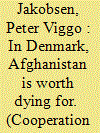

|
|
|
|
|
| Summary/Abstract |
Much to their own surprise, successive Danish governments have succeeded in maintaining the highest level of public support among the nations contributing to the NATO mission in Afghanistan, while suffering the highest number of fatalities per capita. We explain this puzzle in a parsimonious fashion manner using a novel analytical framework derived from elite-competition theory, the event-driven school and the literature on strategic narratives. The Danish government initially built strong political and popular support by making a case for war that resonated with broadly shared pre-existing interests and values (national defence and support for democracy and human/women’s rights), and role conceptions (supporting NATO and US-led military operations as a responsible member of international society). Succeeding governments subsequently maintained a high level of political consensus on Afghanistan through a process of continuous consultation and consensus-building. The political elites supporting the mission then sustained the high level of public support by defining success in ways that did not involve ‘winning’ but focused instead on the attainment of realistic short-term, tactical objectives such as police training and building of schools, and by speaking with one voice to the media. This effectively reduced the Danish media to a conveyor belt passively transmitting the positive views of the political parties supporting the Afghanistan operation and the officers and soldiers carrying it out.
|
|
|
|
|
|
|
|
|
|
|
|
|
|
|
|
| 5 |
ID:
072898


|
|
|
|
|
| Publication |
2006.
|
| Summary/Abstract |
The Nordic peacekeeping model rose as a result of: selection criteria that limited the number of troop contributors to a select group of small and middle-sized states; common as well as national interests that made support for UN peacekeeping the logical policy; and the low-cost/high pay-off nature of the enterprise. Its fall in the 1990s was caused by the vast increase in the number of troop contributors, a strong reluctance to use force beyond self-defence and the growing involvement of the EU and NATO. A Nordic resurgence would have to be based on civilian contributions, but the will to establish such cooperation is unlikely to be mobilized in the near term.
|
|
|
|
|
|
|
|
|
|
|
|
|
|
|
|
| 6 |
ID:
158957
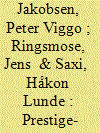

|
|
|
|
|
| Summary/Abstract |
In this article we broaden the conventional understanding of prestige and show that prestige-seeking played a major role in the Danish and Norwegian decisions to provide military support to post-Cold War US-led wars. Both countries made costly military contributions in the hope of increasing their standing and prestige in Washington. Both governments regarded prestige as a form of soft power, which they could later convert into access, influence, and US support. Our findings are far from trivial. They make a theoretical contribution by demonstrating that small powers understand and seek prestige in ways that differ fundamentally from the ways great powers do. They also help to explain why smaller US allies made costly contributions to the Balkan, Afghan, Iraq, and Libyan wars at a time when there was no direct threat to their national security and their security dependence on the United States was low. The high value that small US allies attach to their visibility and prestige in Washington suggests that it is far easier for the United States to obtain military support from smaller allies than Realist studies of burden-sharing and collective action problems would lead us to expect.
|
|
|
|
|
|
|
|
|
|
|
|
|
|
|
|
| 7 |
ID:
105234


|
|
|
|
|
| Publication |
2011.
|
| Summary/Abstract |
The centrality of military coercion in contemporary Western crisis and conflict management constitutes a major policy problem because the United States and its allies are poor at translating their overwhelming military superiority into adversary compliance. The standard explanation provided by coercion theorists is that coercion is hard and that miscalculation, misperception, or practical problems can defeat even a perfectly executed strategy. What they ignore is that the problem also stems from the limits of coercion theory, which has left us with an unnecessarily poor understanding of how military coercion works and how the practical problems involved could be addressed. Our understanding of military coercion would be increased markedly if only coercion theorists would make a greater efforts to do three things, namely (1) provide clear operational definitions of key concepts and variables, (2) engage in systematic and rigorous empirical analysis of generally accepted propositions, and (3) seek to provide solutions to the many policy problems that coercion theorists have identified to date. These simple steps would enhance the degree of cumulativity within the field, provide the principal theoretical propositions with a firmer empirical foundation and make military coercion theory more useful for policy makers.
|
|
|
|
|
|
|
|
|
|
|
|
|
|
|
|
| 8 |
ID:
114959
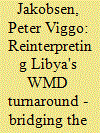

|
|
|
|
|
| Publication |
2012.
|
| Summary/Abstract |
The dominant explanations of Libya's nuclear reversal in 2003 privilege either coercion or carrots treating these instruments as alternatives. Indoing so they ignore that it took a combination of coercion, carrots and confidence-building to turn Libya around. This article demonstrates this by developing and deploying a theoretical framework that integrates these three instruments into a more coherent and convincing explanation of the case. It highlights that analysts and policy-makers would do well to focus more on how different policy tools can be used in combination to achieve desired outcomes than on how individual tools can be employed with decisive effects. It also demonstrates that the Libya success will be hard to replicate.
|
|
|
|
|
|
|
|
|
|
|
|
|
|
|
|
| 9 |
ID:
100588


|
|
|
|
|
| Publication |
2010.
|
| Summary/Abstract |
Iran is viewed by many as a rising power that poses an increasing threat to regional and even global security. This view is wrong for three reasons. Iran's hard and soft power is exaggerated by most accounts; it is too limited to allow the Iranians to dominate the Persian Gulf let alone the Middle East, and its brand of Shi'ism has very limited appeal outside of Iran. Second, growing internal political and economic instability will seriously limit Iran's bid for regional dominance. Third, the failure to stop the Iranian nuclear program has led analysts to underestimate the ability of the other regional powers and the West to balance Iran and contain its influence, even if it acquires nuclear weapons. If these limitations on Iranian power are taken into account the rise seems destined to be a short one.
|
|
|
|
|
|
|
|
|
|
|
|
|
|
|
|
| 10 |
ID:
079095
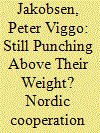

|
|
|
|
|
| Publication |
2007.
|
| Summary/Abstract |
The Nordic countries lost their 'great power' status in peacekeeping after the end of the cold war. This article asks whether they have succeeded in establishing a new model of cooperation that will enable them to regain it. The analysis shows that such a model has been established, but that it remains uncertain whether the Nordics have the collective will to exploit its potential. The article concludes that the Nordics at a minimum would have to establish civil-military rapid reaction deployment packages to reassert themselves as peace operations pace-sette
|
|
|
|
|
|
|
|
|
|
|
|
|
|
|
|
| 11 |
ID:
048528


|
|
|
|
|
| Publication |
Hampshire, macmillan Press, 1998.
|
| Description |
xiii, 215p.
|
| Standard Number |
0333731735
|
|
|
|
|
|
|
|
|
|
|
|
Copies: C:1/I:0,R:0,Q:0
Circulation
| Accession# | Call# | Current Location | Status | Policy | Location |
| 040326 | 327.2/JAK 040326 | Main | On Shelf | General | |
|
|
|
|